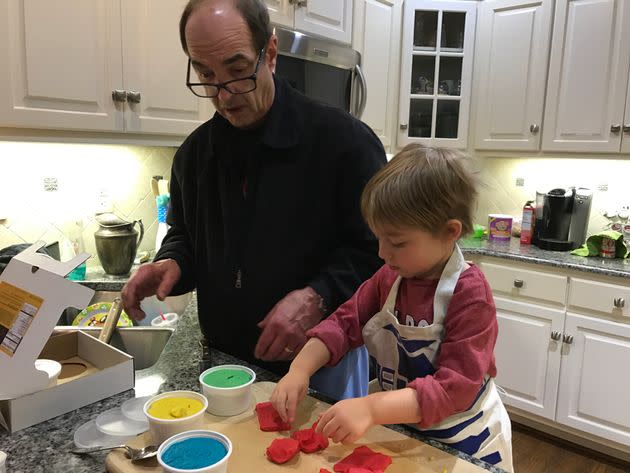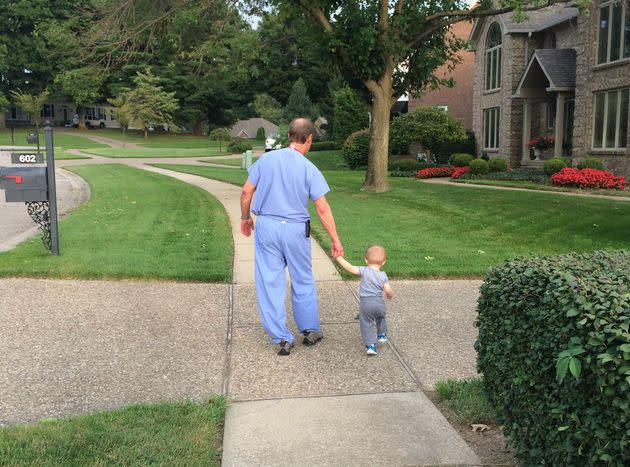“Do you still miss daddy?” my 10 year old asked out of the blue.
Of course I did. My father died unexpectedly a year and a half ago of a heart attack and I thought about him every day. My instinct to call and tell a funny parenting story or ask “The Grill Master” how to prepare our chicken dinners remained. It wasn’t until I started planning our conversation in my head that I remembered why I couldn’t call.
Not wanting to upset my son with a long and complicated answer, I chose the simple truth: I missed Dad every day. To change the mood, I asked if he remembered everything we did together – since 18 months of childhood can feel like 18 years. I wasn’t sure what stuck with him.
“Yes,” said my son, “I remember Dad saying yes.”


Surprised by this new piece of information, I tried to understand what he meant. My father did not fit the definition of a “yes man.” He was not in favor of requests such as roller skating in the house or the use of benches as trampolines. (I should know.) But the memories of Dad’s yes to playing hide and seek, flying kites, or watching cartoons overwhelmed my brain. I couldn’t even count all the hours my father agreed to spend time with his grandson – on children’s terms. And with this realization came the tears of happiness. My son was right: Dad said yes.
Laurel Sims-Stewarta licensed clinical therapist who works with children and adults told HuffPost that saying yes to a child’s request for playtime, a favorite meal, or an outing at the park is a great way to foster connection and build a solid relationship .
“By doing this, our children feel seen and their needs and wants matter,” Sims-Stewart said.
Complying with your child’s requests (as long as they are safe, healthy, and appropriate) increases your child’s sense of belonging and self-worth. And it is in this area that grandparents exert a special influence.
Recent research has found that grandparent involvement during childhood is positively associated with emotional development, cognitive functioning, and social adjustment in early adulthood.
But that certainly wasn’t the motivation behind our weekly sleepovers at my parents’ house. My son just loved it.
My father’s ability to say yes to my child’s pleas to play or take slow walks around the neighborhood was a major reason for this. During ‘yes time’, Dad’s puns flew almost as fast as the paper airplanes they folded, too much sugar was consumed and the giggling from both of them was non-stop. My father’s yes came easily – easier than mine.
‘Grandparents don’t have the job of correcting and teaching everything. This is a weight they are no longer carrying,” says Tiffany Keith, a licensed marriage and family therapist. Because grandma and grandpa are relieved of the heavy responsibilities of raising children, such as dealing with tantrums or dealing with complicated schedules, they have the freedom to say yes more.
Sims-Stewart told HuffPost that the grandparent/grandchild dynamic is unique because grandparents can focus more on fun and building a loving, secure connection. “There’s often less hands-on responsibility and more room for flexibility with rules and expectations. For example, maybe a child can stay up a little later when he or she goes to grandma’s house as a special treat,” Sims-Stewart said.


“Daddy gave me a donut before and after dinner,” was a well-known cry from my son after spending an evening with my father. I had a “one-dessert household,” but my son’s excitement (and my dad’s sly grin) made this sweet treat easy to overlook.
Dad’s yes (aside from the donuts) was consistent with the parenting values my husband and I held. However, my mom brain still wondered if all the positives would eventually lead to one big negative. Can all those yes questions lead to my son having or being entitled to unrealistic life expectations? Would he have a hard time taking no for an answer? Not necessarily.
According to the American College of Pediatrics, children hear “no” so often that saying “yes” (or turning the “no” into a positive phrase, such as “use quiet voices inside” instead of “stop yelling”) helps a child learn consequences and feel valued. Sims-Stewart said that focusing on putting yeses first in our relationships with children (as long as they’re appropriate) can help our children be better emotionally equipped to take a no when it’s really necessary.
My father still maintained loving boundaries when it came to my son. Dad knew it was fun to give my kid some donuts, but… making him eat a full bag would mean an epic sugar crash – and an irritated daughter. At Dad’s house the focus was on being playful and flexible when necessary.
“Boundaries and rules, even if they are more lax at grandparents’ homes, help children gain a sense of security and stability,” Sims-Stewart said.
Grandparents’ rules can differ from the rules that apply at home – and still be healthy. Sims-Stewart said being more flexible with grandparents’ expectations can be special for children, just like when adults take a day off or sleep in on a vacation.
“We all love spending time ‘outside’ our daily rules, and this flexibility helps grandchildren look forward to time with grandparents and makes that time worthwhile,” said Sims-Stewart.
The positive effects can also spread to the rest of the family. Keith told HuffPost that setting different expectations for grandparents can potentially balance over-parenting and allow grandparents to view the parent-child relationship from an outside perspective. “Providing this safe space for grandchildren can ease the pressure on parents and children,” says Keith.
“Which ‘yes’ do you remember most?” I asked my son.
I saw his eyes light up as he recalled not just one memory, but several. He went through all the yeses he could remember: the evening walks. Games of ramp ball. Playing school in the basement. Preparing meals together. His smile grew with each memory, and I could see how every yes from Dad boosted my son’s self-confidence and gave him a sense of worth beyond the approval of parents and peers. And now it stands the test of time.




Leave a Comment